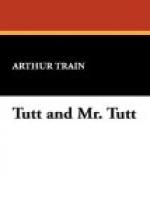“I get you!” exclaimed Tutt enthusiastically. “Of course an allegation of scienter is necessary! In other words you could demur to the indictment for insufficiency?”
Mr. Tutt nodded.
“But in that case they’d merely go before the Grand Jury and find another—a good one. It’s much better to try and knock the case out on the trial once and for all.”
“Well, the Appleboys are waiting to see you,” said Tutt. “They are in my office. Bonnie Doon got the case for us off his local district leader, who’s a member of the same lodge of the Abyssinian Mysteries—Bonnie’s been Supreme Exalted Ruler of the Purple Mountain for over a year—and he’s pulled in quite a lot of good stuff, not all dog cases either! Appleboy’s an Abyssinian too.”
“I’ll see them,” consented Mr. Tutt, “but I’m going to have you try the case. I shall insist upon acting solely in an advisory capacity. Dog trials aren’t in my line. There are some things which are infra dig—even for Ephraim Tutt.”
* * * * *
Mr. Appleboy sat stolidly at the bar of justice, pale but resolute. Beside him sat Mrs. Appleboy, also pale but even more resolute. A jury had been selected without much manifest attention by Tutt, who had nevertheless managed to slip in an Abyssinian brother on the back row, and an ex-dog fancier for Number Six. Also among those present were a delicatessen man from East Houston Street, a dealer in rubber novelties, a plumber and the editor of Baby’s World. The foreman was almost as fat as Mr. Appleboy, but Tutt regarded this as an even break on account of the size of Tunnygate. As Tutt confidently whispered to Mrs. Appleboy, it was as rotten a jury as he could get.
Mrs. Appleboy didn’t understand why Tutt should want a rotten jury, but she nevertheless imbibed some vicarious confidence from this statement and squeezed Appleboy’s hand encouragingly. For Appleboy, in spite of his apparent calm, was a very much frightened man, and under the creases of his floppy waistcoat his heart was beating like a tom-tom. The penalty for assault in the second degree was ten years in state’s prison, and life with Bashemath, even in the vicinity of the Tunnygates, seemed sweet. The thought of breaking stones under the summer sun—it was a peculiarly hot summer—was awful. Ten years! He could never live through it! And yet as his glance fell upon the Tunnygates, arrayed in their best finery and sitting with an air of importance upon the front bench of the court room, he told himself that he would do the whole thing all over again—yes, he would! He had only stood up for his rights, and Tunnygate’s blood was upon his own head—or wherever it was. So he squeezed Bashemath’s hand tenderly in response.
Upon the bench Judge Witherspoon, assigned from somewhere upstate to help keep down the ever-lengthening criminal calendar of the Metropolitan District, finished the letter he was writing to his wife in Genesee County, sealed it and settled back in his chair. An old war horse of the country bar, he had in his time been mixed up in almost every kind of litigation, but as he looked over the indictment he with difficulty repressed a smile. Thirty years ago he’d had a dog case himself; also of the form, style and breed known as bull.




